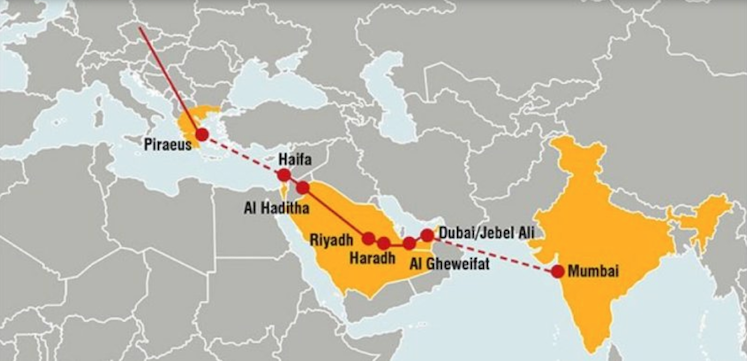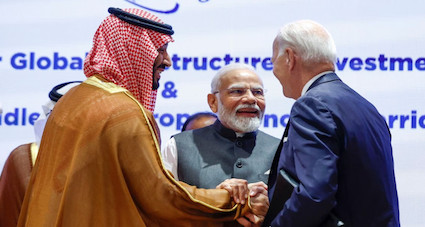I confess I was flushed with excitement at the prospect of India-Middle-East-Europe-Corridor (IMEC) made public at the recent G20 Summit in Delhi.
I mean as an Indian I have groaned we could not have overland trade only because Pakistan and China on flanks and the Himalayas above don’t permit it.
Thus International North South Transport Corridor (INSTC) titillated me for how it opened up Middle East, Russia and Europe for us, the prospects of India and Iran together on a global project in defiance of the United States.
But it also frustrated me that it’s been over two decades since the project was signed and yet it isn’t fully functional; sometimes financial crunch, at other times how Azerbaijan is playing spoilsport for its rotting ties with fellow, bigger Shia neighbour, Iran.
US: A rogue on international treaties
I have also sobered up on IMEC for it involves the United States who are fatal with friends—though there is a silver lining of Saudi Arabia which I would take up later in this piece.

The thing is you don’t trust the United States—you don’t trust a country to build railroads which doesn’t have a single high speed train. Its own Bureau of Transportation Statistics found that between 1990-2021, some 54,539 train derailments occurred in the country, an average of 1,704 per year.
A country which spends just over half of what is required to support its infrastructure (American Society of Civil Engineers 2021 report); a nation which its own president Donald Trump once compared to the crumbling infrastructure of a third-world country, is promising arguably the biggest cooperation project of human history at the expense of America First.
Something doesn’t seem right here: Here we have a country which is notorious for either not signing or ratifying international agreements, or signing and revoking it before the ink has dried up on the worthless paper.
For example out of 374 treaties signed with the native Indians, US flouted all except one.
This is a country which didn’t ratify the Treaty of Versailles (1919) though its president Woodrow Wilson termed the moment as US “now a saviour of the world” at the end of World War I. The US thus was still formally at war with Germany till 1921!
A nation which pats its own back on “human rights” has ratified the fewest number of international human rights treaties (only 5 out of 18 ratified); It stays out of the UN Convention on the Law of the Seas (UNCLOS) though its the stick with which it beats China with.
This “beacon of peace” hasn’t signed the Nuclear Test Ban Treaty; it went back on the Trans Pacific Partnership (TPP), Kyoto Protocol, Paris Climate Accord and of course the nuclear deal with Iran.
Yet we trust this nation with the IMEC, that it wants a peaceful Middle East where anarchy and wars has been its only policy, and that we must not remember to what happened to Nord Stream pipelines or how it ignores the world on Palestine in the United Nations.
We are then told a clutch of European nations we call the West are signing on dotted lines and hailing the IMEC though how they would fund the project remains a mystery. It seems laughable that Europeans who are battling depression would put money on IMEC though gas pipelines from the region is the only carrot which could interest them: Not railroads, sea ports or digital infrastructure.
Saudi Arabia: Looking for a post-hydrocarbon future
Saudi Arabia is the only nation which could put the money where it’s mouth is. And they are determined that IMEC proves a success, even if it costs hundreds of billions of dollars. This is a nation which has poured in countless billions of dollars to host 2029 Asian Winter Games in Saudi Arabia when its largely known as the desert kingdom.
Saudis have lately built a massive sophisticated rail network and plan to triple it soon. A dream coastline line could soon run along Kuwait and the United Arab Emirates.
Saudis would be keen that IMEC is a success. It wants to transition a post-oil world when its theocratic state could collapse to the restlessness of its youth.
It wants to diversify where oil is not the only good it trades in; it wants to become a Middle-East centre of international trade; it no longer trusts, rely or fear the United States enough and hence this embrace with arch enemy Iran at the behest of China no less.
In this pursuit, Saudis see India as indispensable given its market of 1.4 billion people. The Saudi monarchy has an imperative need to become a hub of finance and technology for it understands the other side is chaos and anarchy.
In short, it’s in a hurry to prepare for a post-hydrocarbon future.
The US has been quick to assess the situation. It knows Saudis want transition; it’s aware the transport connectivity is one of India’s sore points. It has seen how China is stealing its thunder in Middle East; that not just Saudi Arabia and Iran; but Qatar and Bahrain, Egypt and Turkey are also mending relations. The Arab League has welcomed Syria in the fold, peace talks in Yemen have picked up.
It just can’t sit on its bum and see China reshape the Middle East or its blood brother Israel get isolated in the region.
Thus I2U2 (India-Israel-UAE-United States) is dusted off the shelf, three of BRICS major members (India, Saudi Arabia, UAE) are co-opted in, and the US has swallowed its theme of anarchy to bait the Dragon in West Asia.
The US hopes that if the multipolarity platform of BRICS could crack up, India and China arguably could be at each other’s throats, it would still be a bipolar world if not a unipolar world and the Global South would be forced to make one choice or the other. It could then divide and rule as is its wont.
It’s the last roll of the dice from the Hegemon who sees a demise of the Western world if multipolarity kicks in and nations don’t deal with WB, IMF, WTO etc or trust their own currencies more than the Dollar.
India has all to gain little to lose
Those nations which are in the front seat of development, the likes of Saudi Arabia and India, don’t mind to feast on the vulnerability of the Hegemon.
Why would both deny increased trade and ballooning profits?
Why would India deny business which till yesterday was coming to China from the Western capitals. If that was the template for China to grow where it is today, why would India let go the moment, never mind a time would come when it would be a sworn enemy of the United States as is China today.
The truth is the United States gave business to China so it could be weaned off Soviet Union; as half a century on, it is looking to favour India so that China could be baited.
It’s unlikely India doesn’t know this game. But it would play on and hope by the time the US turns hostile, it would have grown sufficiently to take it in stride.
All you see these days is our pathetic media full of how IMEC is an alternative to China’s BRI. Suddenly, they find that the Suez Canal is unattractive. They are still reading from that old Cold War script. It’s unlikely they would grow wiser as long as their patron, the West, doesn’t see the writing on the wall.
The Empire sinks on an average $50 billion a year to patrol the Persian Gulf or keep boots in the Middle East, not to say infesting it with terrorists, for the eternal hostility of local population. All of this is now crashing like a pack of cards.
As they say, you reap what you sow.


